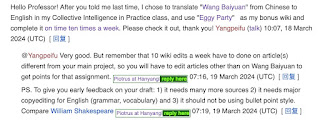W5.1 April 1 (Mon) -Hong gyeongmin
1) The passage provides insights into the autocratic tendencies of community founders in open content communities like Wikipedia, emphasizing their informal leadership roles shaped by initial contributions and influence on community culture. It explores the dynamic between Wikipedia co-founders Larry Sanger and Jimmy Wales, highlighting Sanger's initial leadership and subsequent resignation due to tensions with Nupedia's progress and Wikipedia's community. Wales' influence on Wikipedia's culture is discussed, focusing on his behind-the-scenes leadership style and emphasis on values like patience, civility, and humility. The passage also delves into Wikipedia's governance structure, highlighting the roles of administrators, ArbCom, and the Board of Trustees, while emphasizing the importance of collaborative norms and good judgment among administrators. Overall, it provides a comprehensive overview of leadership dynamics and governance in Wikipedia's communi
